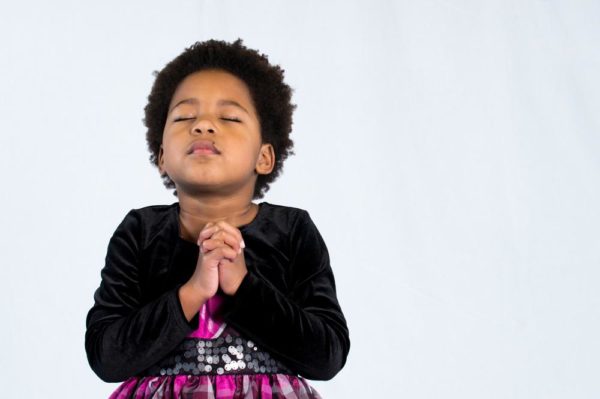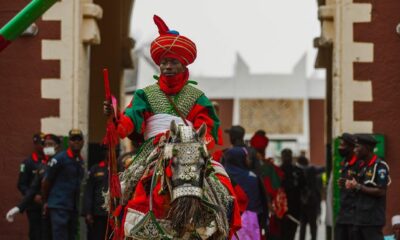Features
7 Times Nigerians Will Not Let Foreign Religion Stand in the Way of Their Cultural Beliefs
 When you talk about religion as it relates to Nigeria, your mind goes to Christianity and Islam…and with good reason. While Nigeria, as a country, is made up of people from over 250 different ethnic groups. They have existing strong cultural practices and beliefs. Majority of the population now subscribe to the Christian or Muslim faiths.
When you talk about religion as it relates to Nigeria, your mind goes to Christianity and Islam…and with good reason. While Nigeria, as a country, is made up of people from over 250 different ethnic groups. They have existing strong cultural practices and beliefs. Majority of the population now subscribe to the Christian or Muslim faiths.
Although foreign, these faiths have become the prevailing practice, and have since influenced the development of our society.
Despite the fact that these religions have endured, its practices have stood the test of time and people now identify exclusively as either Christians or Muslim, even castigating ‘unbelievers’, a number of the followers still hold on to certain cultural beliefs or engage in particular cultural practices that would be considered conflicting to their religion of choice.
Perhaps the fact that the traditional African religion, also characterized by the belief in a supreme being which is distant and unreachable, has some similarities with these foreign religions, makes it super difficult for some Nigerians to completely separate and identify with an entirely new religion. Or maybe, they are not just ready to completely wean themselves off of their tradition/culture. Whatever their reasons, here are 7 situations Nigerians often find themselves in, and almost always refuse to let the foreign religion (which they proudly identify with) stand in the way of their cultural beliefs.
Convenient Superstitions
For Muslims, superstition is only mentioned in the Qur’an as something followed by the enemies of the Messengers, which indicates that the one who follows it and believes in it is as ignorant as those people, to the extent that he believes in these notions.
For Christians as well, the Bible does not support the idea of things occurring by chance, as nothing is done outside of God’s sovereign control. Either he causes or he allows everything in keeping with his divine plan (Acts 4:28; Ephesians 1:10). However, it is not uncommon to find Nigerians who identify with any of these religions, observing superstitious beliefs when they find it convenient or favorable to them.
A Christian especially will be the first to tell you “Ah! No oh. I don’t believe in superstitions, I am a child of God”, but the moment his right-hand starts itching, you will see a heavy smile on his face and if you ask what the good news is, he’ll let you know that he is about to receive good fortune.
A Christian in Benin will not whistle around the Oba’s palace, because he is afraid that doing so can call to spirits and the dead. The one in Warri will rather die than sweep his compound at night or break a mirror, as he is afraid it will bring bad luck etc. If you bring up his faith matter, he will quickly say “resist the devil, and he will flee from you.” Again, the members of the church will be the first to ask the wife of their member, who they dislike or to be fair, suspect had a hand in the husband’s death, to drink the water used in bathing her dead husband or shave her hair prior to the burial. Their reason being that they must “fulfill all righteousness”.
Refusing to marry from certain tribes and ethnic group
One of the major teachings of these foreign religions is “unity in diversity” as well as equality of all humans in the eyes of God. Yet, an Imam would rather disembowel himself before he allows his daughter to marry a Christian, or even a Yoruba Muslim.
Also, an Igbo man will rather stab his first son to death before he lets him marry an “Osu” girl (an outcast). They forget the teaching of their religion and focus on what they know to be the tradition. Again, they do not want to be disregarded by other members of their community. Even when they marry the ‘right’ people, they still insist on the couple following certain procedures as expected by tradition. Schnapps will have to be poured on the floor for the ancestors; certain gifts will have to be given e.t.c.
Resorting to witchcraft and Juju
Despite identifying with Allah or Jesus, most Nigerians still resort to the power of Jujus to protect them and even provide for them. They still consult their “dibias”, “Babalawos” or native doctors for charms, amulets and healing portions. Also, when they have been married for a couple of years without children the first thing they think to do is go look for children at the shrine. These days the shrines have been funkified and modernized. The Babas now use cell phones and Internet. Yay for cosmopolitanism.
Anyway, these people kick the whole idea of having faith and ‘waiting for the time of the Lord’ to the curb. Also, they participate in festivals and events that glorify witchcraft or honor the dead a.k.a ancestors and refer to it as harmless and tradition. You find a pastor or renowned of a church proudly posting the picture of himself being honored in his community as a chief or validating the existence of spirits, reincarnation or the return of the dead; or most annoying, your colleague at work who identifies with every religion, claiming to be both Christians, Muslims and even traditionalists at the same time. They celebrate Easter, Kill Ram for Sallah and attend the “Mmanwu” festival.
Taboos, Ritual killing, and Jungle Justice
The tradition in most parts of the country require sacrifices, sometimes human sacrifices, to be made in certain situations, either to appease the gods, to avert bad luck, gain riches or peace or even just to commemorate the burial of a royal [remember the case of Abobaku in Ile ife?]
These foreign religions do not subscribe to such beliefs, however, Christians or Muslims lamenting over certain incidents and how they are a taboo is pretty common. Despite Jesus, they strongly believe that the violation of certain “taboos” which are not even necessarily part of the commandments stipulated by their religion, will result in illness for either individuals or communities, so a sacrifice is justified. They also sometimes buy into the idea of killing others and selling their parts for rituals. They even pray that their rituals pull through! And most painful perhaps is the jungle justice where they practice “ an eye for an eye” and burn a 14 year old child who stole a bunch of plantain to death, rather than interceding on behalf in prayer.
Hiding Pregnancy, Naming Of Babies On The 7th Day And Hiding Names From People
Children are a gift from the Lord. So also, the Lord who keeps you will neither sleep nor slumber, but the same Christians become the masters of their own fate and take charge of their own protection the moment they get pregnant. They will never post a picture of themselves with a big belly, they refuse to tell people that they are pregnant, and even when they belly starts showing, they claim “very funny, I overate. If I was pregnant will be looking slim like this?” And when it is not too obvious and you ask them “ Ah, when are you due?” they will rather shave their heads than tell you. They will come up with a vague answer.
The only time they show the pregnancy pictures they managed to take is when they’ve already given birth. Despite the foreign religion they practice, they still adhere to the tradition that such things must be kept secret and a pin must be worn on every apparel they put on to ward away those who want to steal their baby. When they have the baby, they don’t tell you its name until the 7-day mark is crossed. They stick to the tradition rather embrace the light of these foreign religions that do not necessarily restrict such things.
Refusing to reveal their travel destination
You will have a conversation with your friend, Lagos, 5 pm, and plan to meet up by 9 pm at Sailors. 8.45pm, you try his number, it is switched off…but the next morning, you see him posting pictures of himself in London. You message him about it asking why he made plans with you when he knew he was travelling…then he apologizes and says: “Ah, it was impromptu”. Really? You had no clue when you applied for the visa, booked plane tickets and booked hotel gan? What a wawu!
The average Christian or Muslim, despite the fact that the Lord is their shepherd or Allah is guiding them, will not let you in on their travel details until they have already arrived there safely. No matter how close you are, they would rather respect the tradition that discourages wanderers from disclosing their travels so that evil does not befall them.
Drinking alcohol at celebrations and festivals
Islamic religion dictates complete abstinence from alcohol. Christian frown upon wine that is too intoxicating as well, they preach moderation. However, the average Nigerian does not regard that when there is a celebration, party or festival. They would rather drink and ask for forgiveness later. In fact, they sometimes do not even hide it. You find Christians and even Muslim couple sharing beer at their wedding reception or offering shots of schnapps or whiskey at their child’s naming ceremony. Or you find a deacon in a church or an Alhaji, introducing himself to you are the No.1 dealer in alcoholic wine and beverages.
There are so many other aspects of the culture that some of these Nigerians have refused to let go. Can you think of more? Let us know in the comments!
Photo Credit: © Damon Yancy | Dreamstime























